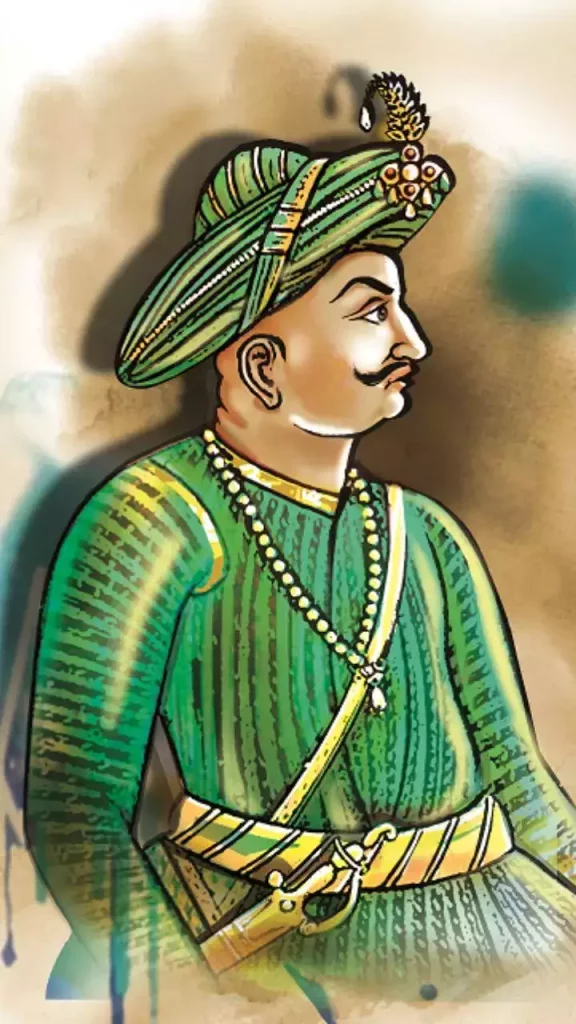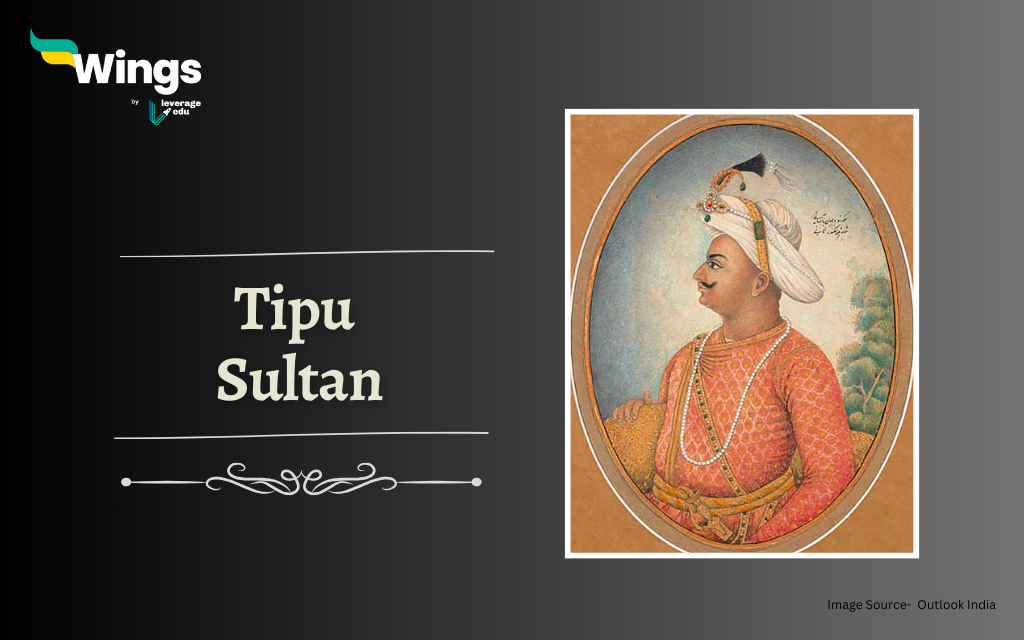Tipu Sultan was the son of Hyder Ali, the Muslim ruler of Mysore. Commonly known as the Tiger of Mysore, he took over the throne in 1782. The great ruler was the true hero of colonial resistance, and his greatest resistance to British rule by defending Mysore during the 3rd and 4th Anglo-Mysore Wars continues to inspire nationalists. Did you know that Tipu Sultan was a great innovator and pioneer of rocket missiles in India? His presence had been impactful, and his legacy still goes on to inspire rulers across the globe. Keep reading to find out more about the Tiger of Mysore, Tipu Sultan’s history!
Contents
Early Life of Tipu Sultan
Tipu Sultan, the eldest son of Hyder Ali and Fakhr-Un-Nissa, was born in Devanahalli, which is currently located in the Kolar district. He was born on November 20, 1750.
- The real name of Tipu Sultan is Sultan Fateh Ali Sahab. He was named after the revered saint Tipu Mastan Aulia of Arcot.
- Hyder Ali captured the throne of Mysore and established the Mysore Sultanate when Tipu was just a child.
- Tipu Sultan was a very skilled youngster. He was also a scholar and had gained proficiency in several languages.
| Tipu Sultan’s Overview | |
| Real Name | Sultan Fateh Ali Sahab |
| Born | 20 November 1750 in Mysore |
| Parents | Hyder Ali and Fakhr-Un-Nissa |
| Spouse | Sindh Sahiba and many more |
| Died | May 4, 1799 |
Military Expeditions
When Tipu was 15, he took part in the 1st Anglo-Mysore War, which occurred in 1766, along with his father. He was in charge of commanding the cavalry corps during the 1767 Carnatic Invasion. Madhav Rao Peshwa, the ruler of the Maratha in 1771, defeated Tipu and Hyder Ali in that war.
When the British captured the fort, an army was dispatched under Tipu Sultan by Hyder Ali against Colonel Baillie. At Pollilur, Baillie was defeated in a decisive battle by Tipu. Following this, he defeated Colonel Braithwaite near Tanjore and took control of Chittoor from the British. After Hyder Ali’s death in December 1782, Tipu assumed power of Mysore on 22nd December 1782.
Also Read – Maratha Empire (1674-1818)
Death of Tipu Sultan
In 1799, three armies marched on Mysore. Two of these armies were from the United Kingdom and one was from Bombay. Tipu Sultan’s army numbered about 30,000 men, while the East India Company had more than 26,000 men.
It was the betrayal of Tipu’s brother-in-law, who aided the British by sabotaging the walls of Mysore. This made it easier for the British to pass through Mysore. Although Tipu’s French military advisors advised him to escape, he refused and was killed in Seringpatnam Fort. He was respectfully buried at Gumbaz near his father’s grave. Tipu Sultan’s history allowed the people to retrospect the chances of betrayal from their own family.

Achievements of Tipu Sultan
Tipu Sultan was best known for his innovative use of rocket science in military expeditions. He used rockets that were fitted with swords and spears and fired at enemies from long distances. He employed these skills very tactfully during the Mysore wars.
Tipu Sultan, during his reign, introduced a new currency in the form of a coin and a new calendar. He is known for his excellent administration skills and the setting up of seven new departments in his government.
Mandyam Iyengars Massacre
Allegedly, Tipu Sultan ordered the killing of 800 families in Srirangapatna. In this massacre, nearly 1,500 members of the Mandyam Iyengars were killed by his army. He ordered the killing of these members when he came to know about how two members of this community were trying to dethrone him with the help of the British. A section of the community does not celebrate the 1st day of Diwali, even today. This is because on this day the massacre took place.
Renaming of Places
In addition to his military expeditions and achievements, the emperor also renamed many places during his reign. The names of the places that were changed have been listed below –
| Old Place | New Place |
| Mangalore | Jalalabad |
| Dindigul | Khaliqabad |
| Gooty | Faiz-Hissar |
| Bepur | Sultanpatanam |
| Mysore | Nazarbad |
| Cannanore | Kusanabad |
| Dharwad | Quarshed-Sawad |
| Kozhikode | Islamabad |
| Ratnagiri | Mustafabad |
Diplomacy – Foreign Relations
Tipu Sultan used his diplomatic skills to defeat both the Marathas and the British with the help of the Afghan ruler, Zaman Shah Durrani. Although Zaman Shah had initially accepted the help request, he had to back off because of the Persian attack on his country. He tried to persuade Ottoman Sultan Abdul Hamid in 1787 to defeat the British.
Legacy
The controversies are plenty against the Ruler of Mysore; however, he is still viewed as a patriot and fondly called Tipu Sultan the tiger of Mysore for his bravery and courage. He played a crucial role, along with his father, in defending his empire from British rule. He resisted the British Empire till his last breath.
Also Read – Mangal Pandey: A Heroic Sepoy’s Journey
Best Books on Tipu Sultan
- The Life Of Tipu Sultan by Kate Brittlebank
- History of Tipu Sultan by Mohibbul Hasan
- Tipu Sultan-The Tyrant of Mysore by Sandeep Balakrishna
- The Dreams of Tipu Sultan
- Select Letters of Tipu Sultan to Various Functionaries
FAQs
Tipu Sultan earned the title “Tiger of Mysore” due to his fierce resistance against British colonial forces and a legendary encounter where he reportedly killed a tiger with his sword after it attacked him. Additionally, he adopted the tiger as his personal emblem, symbolizing bravery and strength.
Tipu Sultan was a pioneer in the use of rocket artillery in India. He expanded the use of iron-cased rockets in military combat, notably against British forces during the Anglo-Mysore Wars. His innovations in warfare were documented in the military manual Fathul Mujahidin.
Tipu Sultan lost his life on May 4, 1799, in the course of the Fourth Anglo-Mysore War. He fell in battle while fiercely defending his capital city, Srirangapatna, from the advancing forces of the British East India Company and its allied troops.
Tipu Sultan introduced several administrative innovations, including a new coinage system, a new calendar, and a reorganized land revenue system. He also established state trading depots and promoted the silk industry in Mysore, contributing to the region’s economic development.
Yes, Tipu Sultan is regarded as one of India’s early freedom fighters for his staunch resistance against British colonial expansion. His efforts to protect his kingdom’s sovereignty have made him a symbol of resistance in Indian history.
Related Blogs
| Prithviraj Chauhan Biography | Mughal Emperor Jahangir |
| Chola Dynasty | Battle Of Ten Kings |
| Battle of Panipat | Kalinga War |
This was all about the warrior, also called the tiger of Mysore, Tipu Sultan history. If you want to read more articles like this, you can get Short notes on the Modern History of India here. Also, you can visit our general knowledge page on Indian History!


 One app for all your study abroad needs
One app for all your study abroad needs












 60,000+ students trusted us with their dreams. Take the first step today!
60,000+ students trusted us with their dreams. Take the first step today!